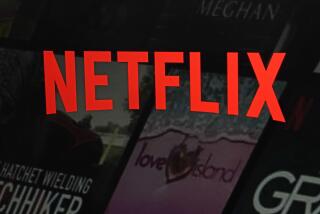Internet: Ready for Prime Time? : Its Ability to Update News and Appeal to Specific Interests Threatens TV Viewership
Some students of the Internet theorize that because of its similarity to television, the Internet represents a greater threat to TV than it does to print.
Like television, the Internet can update stories during the day more easily than a newspaper can. Like television, the Internet can also provide live sound and moving pictures to individual computer screens (through the use of such online services as RealAudio and RealVideo). And like cable television in particular, the Internet can cater to a far wider range of narrow, specialized interests than a newspaper can.
The Internet today is “where television was in 1947,” says Norman Lehoullier, managing director of the interactive arm of Grey Advertising in New York. Television grew exponentially, Lehoullier says, in part because in the beginning “everyone received the same six or seven channels. As the audience grew, you had more and more people watching the same few shows.”
This enabled advertisers to buy time on television, secure in the knowledge that large and growing numbers of people would see their commercials and buy their products.
Advertising thus became the engine that drove television, and it remains so to this day--as network executives have repeatedly demonstrated over the last five decades with their frenzied reaction to even a modest shift in the Nielsen ratings.
Only in recent years--with the introduction and expansion of cable TV, the burgeoning use of the videocassette recorder and the rapid evolution of the computer as a home entertainment and information appliance--has the audience for network television been fragmenting and plummeting. During the 1995-96 television season, ABC, CBS and NBC combined drew only 50% of the total prime-time viewing audience; in the 1978-79 season, they drew 91%.
But the Internet is, by definition, already fragmented. “There could be 10,000 ‘channels’ for any single subject,” Lehoullier says, thus making it difficult for any single site to attract the mass audience that advertisers require.
Many online news organizations are forming alliances--networks--in an effort to combat this problem, most notably NBC, which joined forces with Microsoft last year to create MSNBC, simultaneously a Web site and a 24-hour television news channel.
“I have no illusions about our ability to hold it [the Internet] back,” says Tom Brokaw, anchor for the “NBC Nightly News” and a prominent, regular contributor to MSNBC on TV. “It’s like King Canute trying to hold back the sea.”
In a study conducted this year, the research firm Odyssey found that 30% of its respondents sacrificed TV time to go online. Only one other activity--household chores--was cited as being slighted in favor of cyberspace by more than 11% of those surveyed.
Sports has long been a major component of TV programming, and sports is already a major presence on the Web:
* Most sports teams have their own Web sites.
* Hundreds of Web sites provide real-time sports scores for all major events.
* ESPN’s SportsZone is one of the best and most successful Web sites on the Internet, with about 480,000 users a day. Using RealAudio, ESPN provided a live cybercast of every game in the National Basketball Assn. playoffs, just as it provided live coverage of every regular season game, as part of a fee-based “premium service” that has attracted more than 60,000 customers. (ESPN also cybercast one game a week without charge during the regular season.)
* Instant Sports has used a computer simulator and database to provide pitch-by-pitch coverage of every major league baseball game since the 1995 All-Star game, usually within 30 to 90 seconds of the action on the field.
E-mail is another major element in the Internet’s budding challenge to television. E-mail is expected to grow from about 40 million users in the United States today to 135 million by 2001 as technology makes it increasingly easier to attach documents, photographs, sound and video files to simple text messages.
That would mean half the nation’s population would be using e-mail, and the following scenario might then become commonplace:
Tom, Dick and Harriet come home from work (or from school or a day of shopping or an evening out) and routinely flip on their computers to look at their e-mail. While they’re at it--instead of turning on the television--they check their favorite Internet sites for the latest news headlines, sports scores, weather reports and whatever else interests them.
What lends added credence to this scenario is the widespread and growing presence of the computer in the workplace, where most people cannot watch television. Web sites report that usage is heaviest during the workday, and once people become accustomed to getting whatever information they want with just a click of their mouse, they may continue to do so after they go home.
There is--at present anyway--one major flaw in this scenario, as Nick Donatiello, president of Odyssey, concedes. The Internet is not yet a major entertainment medium (although games are a rapidly growing feature of the online world, and the development of online entertainment is underway everywhere).
“People are more interested in entertainment than information,” Donatiello says. “They spend their time on entertainment, not news and information.”
That is the primary reason for the success of television: It’s mainly an entertainment medium. On TV, even news is presented in an entertaining fashion, with an ever-increasing emphasis on personality, conflict and confrontation.
Many entrepreneurs are hoping to capitalize on both the entertainment value of television and the news and information value of the Internet by combining the two media. Microsoft has made a $1-billion investment in the cable company Comcast and has bought Web TV, a company that makes televisions that permit Internet access. Compaq recently introduced its “PC theater,” a $5,000 appliance that blends a large-screen (36-inch) TV set with a full-service computer.
If Internet technology and creativity don’t make it possible for entertainment to “take over,” the Net will be “a dismal failure,” Donatiello says.
Len Forman, senior vice president of the New York Times Co., said much the same thing this year at an interactive newspaper conference in Houston.
“No matter how much we may desire it, news is not going to be the core driver in the online world,” Forman said. “Unless we see the market size that entertainment can drive, it’s unlikely we are going to see the numbers we need.”






